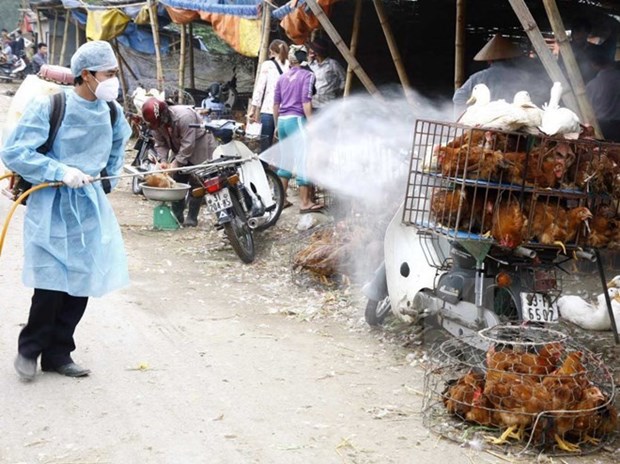 Illustrative image (Source: VNA)
Illustrative image (Source: VNA)HCM
City (VNA) – and cities have drawn up a plan for
prevention of avian influenza A(H7N9) as requested by the Prime Minister,
following several outbreaks in China.
In
the first three months of the year, 487 incidences were reported in China,
including 99 fatalities, according to the Ministry of Health.
As
of March 21, the A (H7N9) virus had not infected either poultry or people in Vietnam,
but it could break out if preventive methods are not carried out well.
The
HCM City People’s Committee, for instance, has issued an action plan for the
prevention throughout the city this year.
In
the plan, the municipal People’s Committee has instructed the Food Safety and
Hygiene Management Board to take the initiative in co-operating with agencies
to strengthen supervision and inspection of poultry at canteens in industrial
parks and export processing zones, schools, restaurants, and food stores in the
city.
Violators
who use or sell poultry without label of origin will be fined, the committee
said.
The
Department of Agriculture and Rural Development is expected to work with local authorities
and other agencies on the surveillance of transport, trade, consumption and
import of poultry.
As
of now, the illegal trading of poultry has occurred at 159 sites, according to
the committee.
Ha
Tan Vinh, from the Can Tho Department of Health’s medical affairs division,
told the Viet Nam News Agency that the Department of Agriculture and Rural
Development had devised a plan on the use of vaccines against avian influenza.
The
free vaccine provision will be divided into three phases, including one from
February 15 to March 5, the second from June 15 to July 5, and the last from
October 1 to 10.
In
Ca Mau province, Nguyen Thanh Dan, head of the province’s Preventive Health
Centre, said that training and preventive methods against avian influenza has
been carried out well.
Dan
said the province has warned farmers to take preventive methods against the
virus.
In
mid-March, the Ministry of Health and Ministry of Agriculture and Rural
Development organised a drill for A/H7N9 prevention in Lang Son province and Hanoi.
Prime
Minister Nguyen Xuan Phuc has also banned the illegal import of poultry through
border gates.
He
said that people from A/H7N9 virus-affected countries such as China should be
under close surveillance at the border gates.
If
the presence of A/H7N9 virus is detected at markets, solutions to eradicate
contaminated food should be implemented.
In
2013, the A/H7N9 virus was found in animals and people in China, according to
the World Health Organisation.
This
strain of avian influenza is of concern because infected people have become
severely ill.
Most
of the cases of human infection with the A/H7N9 virus have reported recent
exposure to live poultry or potentially contaminated environments, especially
markets where live birds have been sold.
This
virus does not appear to transmit easily from person to person.
Since
February 2013, 1,230 incidences of avian influenza A/H7N9 in China, Canada and
Malaysia have been reported, including 428 fatalities, according to the
Department of Animal Health under Ministry of Agriculture and Rural
Development.
Challenges
Trinh
Hung Cuong, deputy head of the Animal Health and Husbandry Agency, said that Hau
Giang province faced difficulties in inspection and monitoring of transporting
and selling chickens because of a shortage of personnel.
The
province lacks funds to hire people to provide vaccinations against influenza
in poultry.
The
weather had become hotter in the daytime, but colder at night, Cuong said,
adding that the temperature difference had contributed to lowering the
resistance of chickens to viruses.
Small
chicken breeding farms are common in the province.
Many
people in the districts of Long My, Vi Thuy and Chau Thanh A breed free range
chickens without asking permission from local authorities, according to Cuong.
The
chickens have not been vaccinated as required.
Moreover,
in the case of influenza outbreak among chickens, farmers have not reported
cases to local authorities. They often kill and throw the chickens into the
river, leading to an increase in the risk of transmission.
At
a conference held last month in Can Tho, Nguyen Ngoc He, head of the Can Tho
Department of Agriculture and Rural Development, said that breeding ducks under
a free range model in rice fields was common in the city.
Districts
and wards in the city have not paid sufficient attention to the management of
breeding and implementation of preventive methods, He said.-VNA
Source: VietnamPlus
